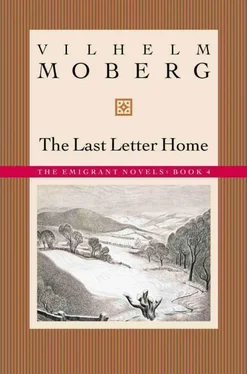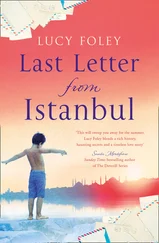I myself offer to go! Let’s meet at Fort Snelling, where we ourselves will choose our officers!
A pox on him who says this is a war among Americans and doesnt concern us! This fight concerns us and our children!
We have sworn loyalty to this country!
This country is now in danger!
The appeal was dated, Red Wing, September 2, 1861, signed H. Mattson, “a countryman.” Karl Oskar read it several times, and thought deeply about it.
It was high time. .!
The following night he could not sleep a wink, and in the morning he said to his wife that he was going to Stillwater and sign his name on the volunteer list. He would report for the war.
II. I AM CONCERNED WITH YOUR ETERNAL LIFE
— 1—
Kristina was sewing on her new sewing machine in the living room. Her right hand controlled the balance wheel while her left fed it the cloth. The pedals moved rhythmically, she felt them as a pair of heavy iron soles. She sewed with foot power rather than hand power. This sewing machine, Karl Oskar’s gift to her last Christmas, had already saved her many hours of sewing and basting with needle. American menfolk made many inventions that helped greatly. This machine was an expensive apparatus — it had cost twenty dollars — but with it she could sew ten times faster than by hand. It was a very clever invention: the sewing contraption had pedals and buzzing wheels, shuttle and spool, over-thread and under-thread. It was truly unbelievable that such a capable machine — made for women’s use — would have been invented by a man.
She was sewing shirts for Karl Oskar from a roll of flannel she had bought at Klas Albert Persson’s store. Flannel was the cloth used by Americans for strong everyday wear. Otherwise she bought cheap calico or the most inexpensive cotton but the latter came in only a few ugly patterns at Klas Alberts.
It was a warm day even though it was already in September. Kristina pedaled her machine with bare feet. In winter the iron felt cold against the soles of her feet, but in summer cool and pleasant. The wheel’s buzzing turned into a noisy roar when she pedaled the machine at high speed.
Karl Oskar came in and sat down beside her. She slowed down her tramping and stopped the balance wheel, letting her hand rest on it as she turned to her husband.
She had seen in his face, earlier today, what he had to say. She had expected it for a long time. He had decided at last.
“I can’t delay any longer! I must volunteer! Otherwise I’ll be forced to. .”
She was prepared and calm. Nor had he expected his wife to burst out crying.
She said quietly, “You’re not forced yet.”
“No — but I might be soon. They might start conscription the first of October.”
She raised her voice. “Wait till then!”
“It’s more decent to volunteer before they begin drafting. I’d be ashamed to be forced.”
Kristina looked questioningly at him. She moved her bare feet from the pedals of the sewing machine and rested her hands on her knees. “You wish to go to war of your own free will, Karl Oskar?”
“I’ve fought it the whole summer. Now I must go.”
As early as April Old Abe had called his loyal citizens. It was now September and at last he would answer: I’m coming! He said he had no wish to go out in any war if he could get out of it honorably. He could always find excuses and delays: Last spring the fields needed seeding, now in fall he could say he needed to harvest the crop. Still later he could use the threshing as an excuse not to volunteer. And during the winter there was timber to fell and saw for the new main house he intended to build. That would bring them to spring with the new planting and the same old excuses. In that way he could go on year after year.
Until the North had lost the war!
Of what use would it be then that he had stayed at home and tended to his chores? If the North lost, the slave powers could do what they wanted. The slave owners used their Negroes like cattle and they could use the people up here in the same way. Who could say that they would be allowed to keep their land and their home? Here they had been able to live and govern themselves because the United States was their protection and security. But would it remain so if the Union were broken?
Many had gone out in the war before him. He, as they, had believed it would be over in one summer, in which case it would have been unnecessary to volunteer. But now everyone realized that this misery would last long, and he could not expect others to jeopardize their lives and defend his wife, children, and home while he himself dodged. If a healthy man stayed home after this he must be a coward.
“But I don’t know of anyone hereabouts who has gone,” she said. “You’ll be the only one from our settlement.”
“The others are too old.”
Danjel Andreasson and Jonas Petter were both near sixty; Petrus Olausson and Johan Kron were somewhat younger but both had reached fifty; Anders Månsson was a drunkard and useless for military service; Algot Svensson was about his own age, but last winter he had torn one of his eyes on a sharp branch and consequently was not able-bodied. The only one in their section who would have to go in a draft would be himself.
Kristina’s fingers returned to the piece of cloth in the machine. Would she have to prepare Karl Oskar for war? Then she must hurry up and get these shirts ready for his rucksack.
The memory of an evening long ago in another country came to her. The children were asleep, it was silent in their house, the fire had burned down to glowing embers. Then he had suddenly begun to talk: He had decided they would emigrate to America.
For a long time she had been against it; she wanted to remain in her home community. To emigrate seemed to her as perilous as to go to war. Many had fallen on the emigrants’ road. But he had thought through his decision carefully, and his will had prevailed. Now he wanted to go to war; this time too he had long pondered and weighed before he decided.
Kristina remained silent. Karl Oskar became uneasy. Had his decision hit her harder than he had expected? He added: It was not that he wished to participate in the singing of joyous war songs; it was not in happiness that he went, rather in deep sorrow. But he was forced to, he must not fail, his conscience bade him. If he threw off his duties on others, he would feel like a weakling, a clod.
“You mean you must enlist to set your conscience at rest?”
“Yes, to regain my peace of mind.”
“But your conscience says you must not kill your neighbor. Don’t you know the fifth commandment?”
“That commandment doesn’t hold in war.”
“The catechism doesn’t say war is an exception?”
“One must defend oneself.”
“The neighbor you’ll kill says the same: I must defend myself!”
Karl Oskar moved closer to his wife and took hold of her hand: “Kristina, are you against it? Are you absolutely against it?”
“I only want you to wait till you’re forced to go.”
“But I’d rather go of my free will than be drafted.”
“That’s because of false pride. It’s only vanity.”
She pushed back her chair from the sewing machine. “Do you want to know why I’m against it?” It came almost as an outcry. “I don’t want you to go out and kill people! I don’t want your hands to kill anybody! I don’t want your neighbor’s blood on you! I don’t want you to be guilty of people’s lives! I don’t want you to be a murderer, Karl Oskar!”
“Oh — in that way. .” was his embarrassed reply.
“I don’t want you to go into eternity with blood on you! That’s why! It is your eternal life that is in question! If you take someone else’s you lose your own! I don’t want you to be lost forever! I am concerned with your eternal life!”
Читать дальше












